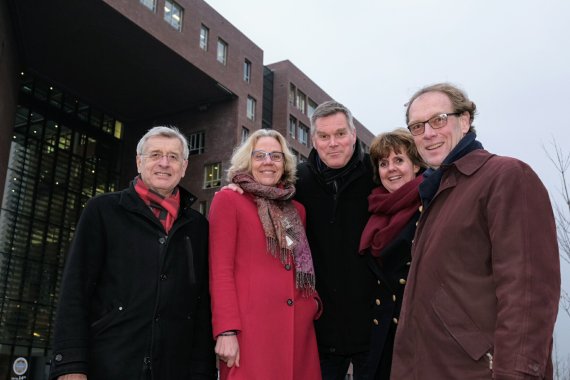The LEB Foundation board. © Guy Ackermans
Not many people know of the LEB Foundation, which was named after the Landbouw Export Bureau (Agricultural Export Office) that was established by the Netherlands during World War I to promote trade with the neighbouring countries during the war. When the treaties were signed in 1918, there was a sum of 280 thousand guilders still in the LEB Foundation. This money has produced such revenue that Wageningen researchers still benefit from it.
750 euros
Each year, the LEB Foundation awards funding to about sixty applications from WUR PhD candidates, postdocs and international visiting staff members; the funds are to be spent on a study trip or conference abroad. They receive a maximum of 750 euros to cover travel and accommodation costs, says Wim Heijman, professor of Regional Economics and both secretary and treasurer of the foundation. He manages the foundation’s capital – about two million euros, which has an annual return of around 60,000 euros.
Summer School
Meteorologist Imme Benedict was one of the fortunate ones last year. She wanted to participate in a summer school in Switzerland on the topic of creating climate models. ‘An expensive assembly’, the PhD candidate says, ‘but on the exact topic of my field, with many prominent names whose articles I had read.’ Luckily, the LEB Foundation covered half the costs. ‘Amazing; for an entire week, you speak with interesting people. Now, I am more aware of the state of the art in my field.’
Mounds
The LEB Foundation used to finance Wageningen research as well. Projects that had been funded include archaeological research into the Groninger and Frisian mounds, a quadripartite book on Javanese butterflies, studies into the relation between groundwater level and crop yield, and research into ways to increase milk production of Frisian cattle. The foundation ceased this research funding.
Helping hand
The LEB Foundation board consists of five Wageninger professors. Besides Heijman, these are Ivonne Rietjens (chair), Marcel Dicke, Imke de Boer and Remko Uijlenhoet. The foundation only participates in co-financing, the chair group has to contribute the other fifty percent. ‘Sometimes, young people need a helping hand to deliver that research performance’, Heijman says. ‘We have therefore chosen to provide small grants to a large number of young researchers.’
Water treatment
In 2015, environmental technologist Wei-Shan Chen received a grant to present his research at a large conference in Chile on wastewater treatment techniques. The PhD candidate had adapted an existing treatment to achieve better results. ‘It was groundbreaking, but nobody believed it yet.’ During the conference, he made important connections with whom he now collaborates to transform urban waste into useful resources for agriculture and industry.
Photograph
To celebrate its centenary, the board of the LEB Foundation had a photograph taken. Furthermore, the LEB board also presented the new website. On this website, students and PhDs explain what they did with the contribution from the LEB Foundation, and a world map shows which places the young researchers have visited. A bit of publicity is always welcome, says Heijman. ‘We receive just the right amount of applications; we rarely have to disappoint people.’ The applications are assessed by the University Fund Wageningen.
The new website is under construction; additional information is available here.
Weekly updates about studying and working at WUR? Subscribe to the newsletter now!

